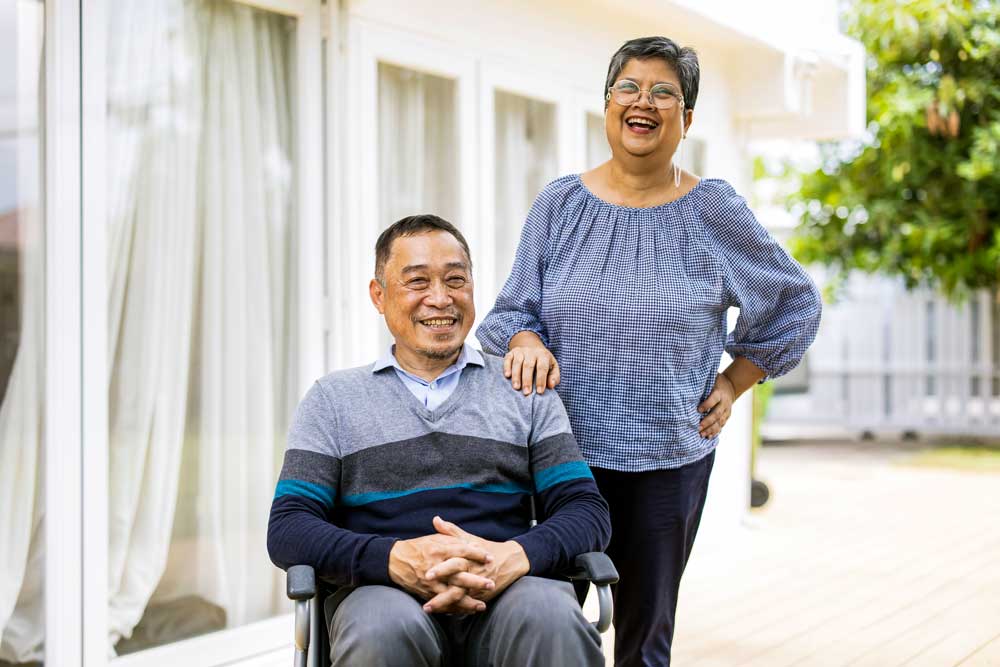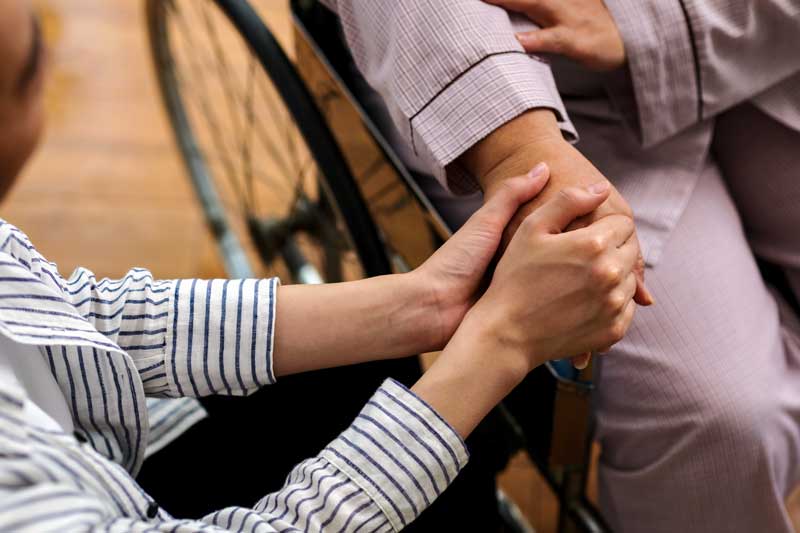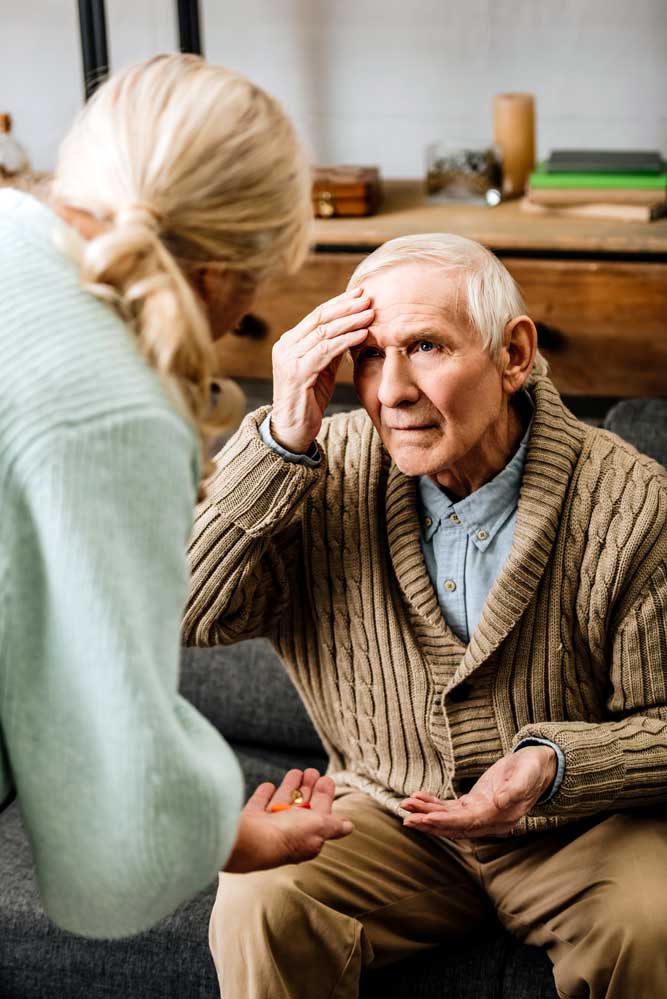
Being a Caregiver
Being a caregiver for a loved one in hospice care is a role filled with compassion, commitment, and sometimes, challenges. This page is designed to provide family caregivers with practical tips and resources to support their loved ones and themselves during this time. We have organized the information by topics to make it easy to find what you need.
Caregiving Tips
Managing Pain and Symptoms
Ensuring your loved one is comfortable is a top priority. Here are some tips to help manage pain and symptoms effectively:
- Regular Medication: Keep a consistent schedule for administering pain medications. Preventing a drop in the blood level of medication helps maintain continual pain control.
- Record Keeping: Maintain a log of medication times and dosages to track effectiveness and identify any patterns in pain relief needs.
- Observation: Be vigilant for signs of pain such as grimacing, moaning, or guarding of body parts, and communicate these to the hospice team.
- Comfort Measures: Use pillows to support your loved one’s body, and provide a calm and soothing environment.
Nutrition and Hydration
Maintaining proper nutrition and hydration can be challenging but is crucial for comfort and health.
- Small, Frequent Meals: Offer small, nutritious meals throughout the day rather than three large ones.
- Soft Foods: If chewing is difficult, opt for soft or blended foods like soups, smoothies, and yogurt.
- Hydration: Encourage sips of water or ice chips regularly. Sometimes, thickened liquids are easier to swallow.
- Favorite Foods: When possible, provide favorite foods to encourage eating and maintain a sense of normalcy.


Emotional and Psychological Support
Emotional wellbeing is as important as physical health. Here’s how you can provide emotional and psychological support:
- Active Listening: Spend time listening to your loved one’s concerns and fears without trying to fix everything. Sometimes, a listening ear is the best support.
- Provide Reassurance: Offer comfort through gentle touch, reassurance, and maintaining a calm presence.
- Involve Them in Decisions: When appropriate, involve your loved one in decisions about their care to help them feel in control.
- Seek Counseling: Don’t hesitate to reach out for professional counseling services available through hospice for both your loved one and yourself.
Personal Care and Hygiene
Maintaining personal hygiene is essential for dignity and comfort.
- Bathing Assistance: Help with bathing, dressing, and grooming as needed. Maintain privacy and comfort during these activities.
- Oral Care: Regular oral hygiene can prevent discomfort. Use a soft toothbrush and keep the mouth moist with swabs.
- Skin Care: Regularly check for signs of pressure sores and keep the skin clean and dry. Use lotion to prevent dryness.
Coping with Fatigue and Burnout
Caregiving can be physically and emotionally exhausting. Here’s how to manage caregiver fatigue and avoid burnout:
- Respite Care: Utilize hospice respite care services to take a break. It’s essential to rest and recharge.
- Accept Help: Don’t be afraid to ask for and accept help from friends, family, and volunteers.
- Healthy Lifestyle: Try to maintain a healthy lifestyle by eating well, exercising, and getting enough sleep.
- Support Groups: Join a caregiver support group to share experiences and gain support from others in similar situations.
End-of-Life Care
Understanding what to expect can help you prepare for the end-of-life phase and provide the best care possible.
- Recognize Signs: Be aware of the common signs of approaching death, such as increased sleep, decreased food and fluid intake, and changes in breathing.
- Provide Comfort: Focus on comfort measures, such as positioning for ease of breathing, offering pain relief, and creating a peaceful environment.
- Emotional Presence: Continue to talk to and touch your loved one, as hearing is believed to be the last sense to go.
- Seek Guidance: Don’t hesitate to contact the hospice team for guidance and support during this time.

Caring for Someone with Dementia
Creating a Routine
Establishing a routine can help reduce confusion and anxiety for those with dementia.
- Consistent Schedule: Keep daily activities like bathing, dressing, and eating at the same time each day.
- Use Reminders: Assist your loved one with to-do lists, calendars, and reminder systems for medications.
Encouraging Independence
Promote independence while ensuring safety.
- Simple Choices: Allow your loved one to make simple decisions, such as what to wear or eat.
- Participation in Activities: Involve them in safe and manageable household tasks and hobbies they enjoy.
Discover invaluable insights to support your journey as a caregiver. Learn tips for ensuring the safety and well-being of loved ones with dementia. Click the link to read our essential brochure and empower your caregiving decisions.
Safety and Environment
Creating a safe and comfortable environment is crucial.
- Clear Pathways: Remove tripping hazards like small rugs and electrical cords.
- Proper Lighting: Ensure good lighting and minimize shadows to reduce confusion.
- Safety Measures: Use grab rails, handrails, and safety plugs to prevent accidents.
Communication Tips
Effective communication can ease frustration and improve the caregiving experience.
- Simple Language: Use short, clear sentences and speak slowly.
- Repetition: Be patient and repeat information as needed without showing frustration.
- Non-Verbal Cues: Use body language, eye contact, and touch to convey reassurance.

Emotional Support
Supporting emotional well-being is essential for both the caregiver and the person with dementia.
- Calm Environment: Create a calm and quiet environment, especially during moments of agitation.
- Engage in Favorite Activities: Encourage activities that your loved one enjoys, such as listening to music, reading, or walking.
- Validation: Acknowledge their feelings and provide reassurance.
Contact us
Being a caregiver is a demanding but profoundly rewarding role. By using these tips and seeking support when needed, you can provide the best care for your loved one while also taking care of yourself. Remember, you are not alone on this journey—our hospice team is here to support you every step of the way.
Use our simple online form to get in touch, or for a more immediate response, call us directly on our hotline at (800) 841-4938. Our compassionate team is ready to offer the support and care you need.

